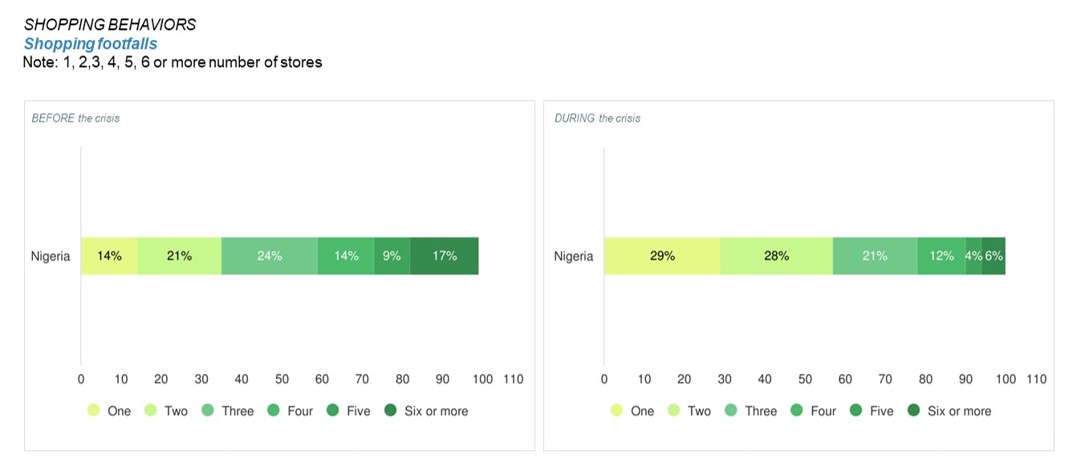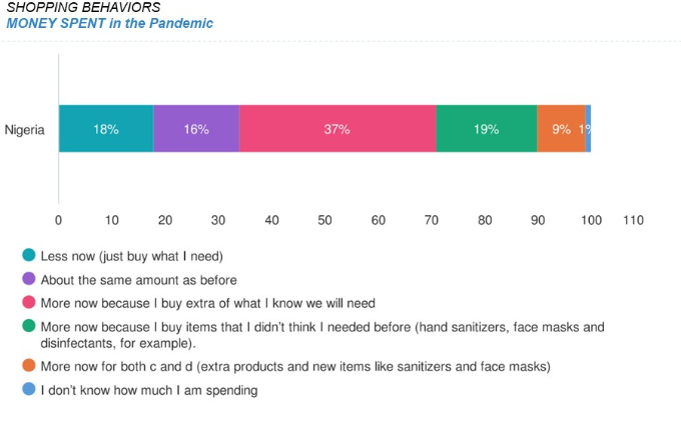The world as we know it has been altered by the COVID 19 pandemic, every aspect of our lives has been tippled one way or the other, COVID-19 and shopping among Nigerians has been an interesting mix data will show. Our daily activities are being gutted with concerns; shopping in a pool of this concern circle, consumers and brands alike have been affected, we have seen a reduction in footfall in stores. Economies are affected and businesses are having to make difficult business decisions.
Artis, a global market research network partnered with Webhaptic Intelligence a leading Market Research Firm in West Africa, and other Market Research Agencies across the world to gather insight on the shopping habit of people in Nigeria, Argentina, Brasil, Chile, France, Germany, Italy, Mexico, Poland, Spain and United States.
Webhaptic Intelligence, in this survey, used CATI (Computer Assisted Telephonic Interview) to generate some key findings from the public’s response to the pandemic from shopper’s concerns, their willingness to pay more for shopping product, to the amount spent before and during the COVID-19 crisis.
COVID-19 and shopping among Nigerians, the takeaways.
The number of people who shopped in just one store doubled during the COVID 19. Before the pandemic, 14% shopped at just a store, the number jumped to 29% during the pandemic and it just keeps dropping, more and more people are shopping in fewer stores per time. Research across the world also corroborated this result as it shows that shoppers view grocery stores as one-stop shops where they can get essentials and some non-essentials at once which eliminates different trips to different shops, reducing their exposure to the virus in the long run.
Webhaptic Intelligence Survey, 2020
Artis, a global market research network partnered with Webhaptic Intelligence a leading Market Research Firm in West Africa, and other Market Research Agencies across the world to gather insight on the shopping habit of people in Nigeria, Argentina, Brasil, Chile, France, Germany, Italy, Mexico, Poland, Spain and United States.
Webhaptic Intelligence, in this survey, used CATI (Computer Assisted Telephonic Interview) to generate some key findings from the public’s response to the pandemic from shopper’s concerns, their willingness to pay more for shopping product, to the amount spent before and during the COVID-19 crisis.
The number of people who shopped in just one store doubled during the COVID 19. Before the pandemic, 14% shopped at just a store, the number jumped to 29% during the pandemic and it just keeps dropping, more and more people are shopping in fewer stores per time. Research across the world also corroborated this result as it shows that shoppers view grocery stores as one-stop shops where they can get essentials and some non-essentials at once which eliminates different trips to different shops, reducing their exposure to the virus in the long run.
Webhaptic Intelligence Survey, 2020
Delivery services operators are open to opportunities at this point, 75% of shoppers are willing to pay more if they order for pickup online/via calls. In this regard, some studies show that Gen X, Millennials, and Gen Z are more likely to use an App to order for pick up. A percentage of people are shifting to online shopping and embracing doorstep delivery to minimize the level of exposure to the COVID19. 50% of shoppers are also willing to pay more if their orders are pre-picked by someone; this way, shoppers just pick up their order without having to scout or browse through products on the shelf, rubbing shoppers of the ability to see, touch, and feel. 55% of shoppers will go to nearby stores to purchase essentials.
At this point, convenience and availability of products come to play; brands need to connect with the right consumer in the right way at the right time, hence the period and place of availability is key to connecting with the need of the consumer at the right time. Convenience, availability, and value seem to be the mantra of consumers in this period.

Webhaptic Intelligence Survey, 2020
While it is important to explore the changing habits of shoppers in Nigeria, we need to know what lasting impacts COVID 19 will have on shopping habits? What products will be shopper’s priority and which will be the least, how will brands of Non-essential products thrive while we wait for this pandemic to end?
Brands need to understand their consumers’ buying/shopping habits and how they make decisions, this information is priceless business intelligence that can be harnessed for business growth, positioning, and packaging amongst other things. COVID-19 and shopping among Nigerians, the takeaways.
To obtain a quote or proposal, send an email to info@webhaptic.com



